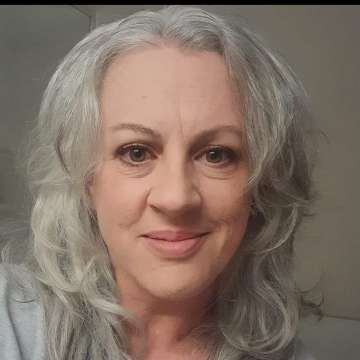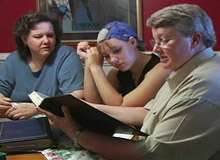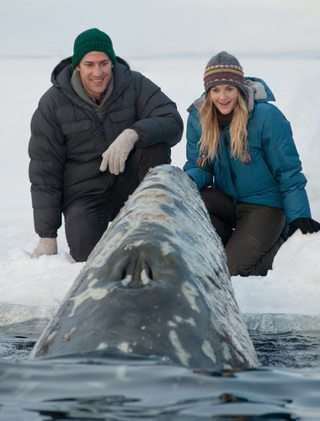Hearing the voices recently insisting that it is best for a child to grow up with one father and one mother reminds me of a powerful documentary that aired this January on MTV called, I Have Gay Parents. Part of the ThinkMTV series entitled True Life, I Have Gay Parents follows three teens through their every day lives in a riveting look at what it means to have gay parents.
Hope is an adopted dark-skinned girl growing up on Staten Island with two white dads. She is preparing to leave for Wellesley College and her dads are shown fussing and worrying about her needs and desires (in one case, her yen for a tattoo — about which they are not happy). They obviously care deeply about her and are having a difficult time letting their chick leave the nest.
Aidan's story was more suspenseful as she was trying out for the position of drum major at her conservative high school in Richmond, VA. . .
Aidan lives with her birth mom, but, instead of the father, who ran off as soon as he heard the news of the pregnancy, her other parent is a second mom, who has raised Aiden as her own. We see the two moms encouraging their daughter to visualize becoming the drum major, helping her to practice, reminding her to smile. We also meet the band's director who admires Aidan's talent, and dedication to the band but openly worries of what other parents would say or do if he were to bestow leadership on the "token" gay-rights student advocate in school. It didn't seem very likely for Aidan to win the competion in such an ultra-conservative Christian community. But, undaunted by the odds, determined and self-confident, Aidan won the coveted role as drum major. And, checking back with the school several weeks later, the film's producers found that although the director feared parents would pull their kids out of the band in protest, none of the students had withdrawn.
The third teen was Cooper, a young man who grew up in Berkeley, Calif., and is now a freshman in Iowa. "His ‘two moms' are life partners who made a decision 19 years ago that one of them would become pregnant by a sperm donor."
Linda Stasi wrote in the New York Post:
“Following these very nice, very well-balanced kids through the struggles of life is great TV. For one thing, it points out that it’s not your parents’ sexuality that matters as much as how they treat you. A child who is loved unconditionally, who is given boundaries within reason and whose parents are courageous in their beliefs — whatever those beliefs are — without drumming it into their kid’s head, turns out to be the kind of kid we all would like to call our own.”
"Following these very nice, very well-balanced kids through the struggles of life is great TV. For one thing, it points out that it's not your parents' sexuality that matters as much as how they treat you. A child who is loved unconditionally, who is given boundaries within reason and whose parents are courageous in their beliefs — whatever those beliefs are — without drumming it into their kid's head, turns out to be the kind of kid we all would like to call our own."
The Web site AfterEllen.com agrees that the teens in the documentary are all "thoughtful, insightful, and — dare we say — well adjusted."
These portrayals are supported by positive statistics about kids with gay families. For example, a recent Tufts University study found that children who are raised in same-sex families have no difference in gender identity, sexual orientation, or emotional issues than their peers from heterosexual households.
These portrayals are supported by positive statistics about kids with gay families. For example, a recent Tufts University study found that children who are raised in same-sex families have no difference in gender identity, sexual orientation, or emotional issues than their peers from heterosexual households.
Another study with similar results is the 2004 National Longitudinal Study of Adolescent Health.
Interestingly, the Tufts study also found that children from gay families might be better off developmentally, exhibiting higher self-esteem, better behavior, and fewer incidences of mental illness and emotional disturbances. Experts suggest that this trend is due to the open-mindedness and stoic attitudes that many gay people must adopt in order to survive in a discriminatory world. “I think that my parents being gay has given me a lot of freedom to be who I am and to explore further who I’m going to become,” says Hope.
Interestingly, the Tufts study also found that children from gay families might be better off developmentally, exhibiting higher self-esteem, better behavior, and fewer incidences of mental illness and emotional disturbances. Experts suggest that this trend is due to the open-mindedness and stoic attitudes that many gay people must adopt in order to survive in a discriminatory world. "I think that my parents being gay has given me a lot of freedom to be who I am and to explore further who I'm going to become," says Hope.
If more people could see this sort of portrayal of gay families on television, it would be more difficult for Conservatives to pass muster in today's debate on a marriage ammendment to the Constitution. They couldn't use the old "protect the families" argument. The gay moms and dads in this show aren't raising dysfunctional children. "They are simply doing laundry, making dinner, and driving their kids to school like everyone else."










Be the first to comment